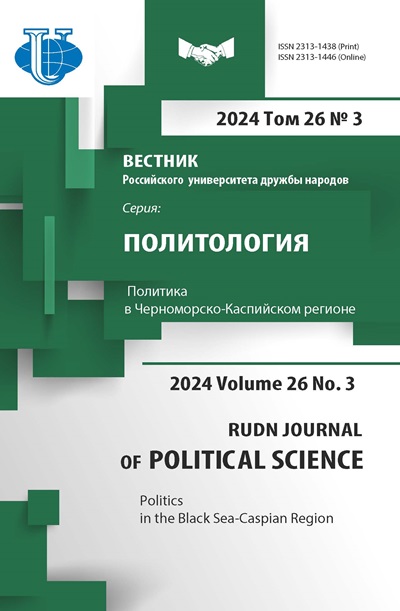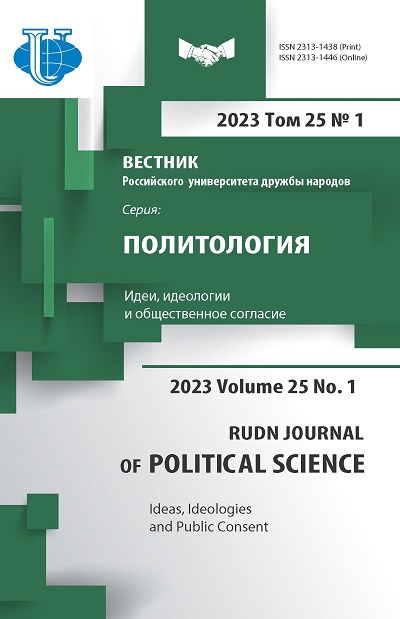“How Do We Arrange Russia”: The Problem of Social Harmony in the Discourse of Post-Soviet Identity
- Authors: Iokhim A.N.1,2, Laguzova M.A.1,2
-
Affiliations:
- Federal Center of Theoretical and Applied Sociology of the Russian Academy of Sciences
- Lomonosov Moscow State University
- Issue: Vol 25, No 1 (2023): Ideas, Ideologies and Public Consent
- Pages: 77-96
- Section: RUSSIA IN A FINE LINE BETWEEN CLEAVAGES AND SOCIAL HARMONY
- URL: https://journals.rudn.ru/political-science/article/view/34037
- DOI: https://doi.org/10.22363/2313-1438-2023-25-1-77-96
Cite item
Full Text
Abstract
The collapse of the Soviet Union, the large-scale transformation of the political and social structure in the early 1990s actualized the problem of nation-building in the new Russian state. The search for a “national idea” has contributed to the fact that over the past thirty years several dominant concepts of identity have changed in the Russian official discourse: from the denial of Soviet identity and the strategy of rapprochement with Western democracies to the construction of a great-power conservative identity of the “successor state”. The central place in the discourse of Russian identity is occupied by the problem of achieving social harmony through the elaboration of attitudes to the past, the construction of political values, the definition of symbolic boundaries of the political community. This research is devoted to the comparison of ideas about social harmony articulated within the framework of key concepts of post-Soviet identity of Russia.
About the authors
Andrey N. Iokhim
Federal Center of Theoretical and Applied Sociology of the Russian Academy of Sciences; Lomonosov Moscow State University
Author for correspondence.
Email: andrey.iokhim@gmail.com
ORCID iD: 0000-0001-8125-6363
PhD in Political Sciences, Research Fellow of the FCTAS RAS, Researcher at the Faculty of Political Science, Lomonosov Moscow State University
Moscow, Russian FederationMaria A. Laguzova
Federal Center of Theoretical and Applied Sociology of the Russian Academy of Sciences; Lomonosov Moscow State University
Email: laguzova@bk.ru
ORCID iD: 0000-0003-1507-1883
Junior Researcher of the FCTAS RAS, Postgraduate Student of the Faculty of Political Science, Lomonosov Moscow State University
Moscow, Russian FederationReferences
- Abramov, A.V. (2019). Crimean consensus as a phenomenon of Russian political consciousness (pp. 3–9). In A.A. Volkov (Ed.), The Fifth anniversary of the reunification of Crimea with Russia: results and prospects. Collection of scientific articles based on the materials of the Sixth International Scientific and Practical Conference. Saratov: Saratov source publ. (In Russian).
- Anderson, B. (2001). Imagined Communities. Moscow: Canon-Press-Ts. (In Russian). [Anderson, B. (1983). Imagined Communities. Reflections on the Origin and Spread of Nationalism. Verso].
- Bagaeva, K.A., Zhapova, N.A. (2020). Westernism and Slavophilism: Two hundred years later. Eurasianism and the World, 1, 16–21. (In Russian).
- Blackburn, M. (2021). Mainstream Russian Nationalism and the “State-Civilization” Identity: Perspectives from Below. Nationalities Papers, 49(1), 89–107.
- Bredikhin, A.L. (2021). National idea: State-legal aspect. State power and local self-government, 3, 18–21. (In Russian).
- Bredikhin, A.L. (2021). The concept of the national idea in amendments to the Constitution of the Russian Federation 2020. Economics. Sociology. Right, 1(21), 70–73. (In Russian).
- Drobizheva, L.M. (2020). Russian identity: The search for definition and dynamics of distribution. Sociological research, 8, 37–50. (In Russian).
- Dugin, A.G. (2021). Manifesto of the Great Awakening. Socio-political magazine “Izborsky Club”, 5(91), 4–23. (In Russian).
- Foucault, M. (1972). The Archeology of Knowledge. L.: Routledge.
- Goode, J.P. (2018). Everyday patriotism and ethnicity in today’s Russia. In B.P. Kolstø & H. Blakkisrud (Eds.), Russia before and after crimea: Nationalism and Identity, 2010– 17 (1st ed., pp. 258–281). Edinburgh University Press.
- Gorbachev, M.S. (1988). Perestroika and new thinking for our country and for the whole world. Moscow: Politizdat. (In Russian).
- Gudkov, L.D. (2004). The structure and nature of the national identity of Russia. Polit.ru. April 5. Retrieved from: https://polit.ru/article/2004/04/05/national_identity/#_ftnref8 (In Russian).
- Gudkov, L.D. (2005). The memory of the war and the mass identity of Russians. The Inviolable Reserve, (2–3), 46–57. (In Russian).
- Hedetoft, U. (1993). National Identity and Mentality of War in Three EC Countries. Journal of Peace Research, 30(3), 281–300.
- Kratochvíl, P., & Shakhanova, G. (2020). The patriotic turn and re-building Russia’s historical memory: Resisting the west, leading the post-soviet east? Problems of Post-Communism, 68(5), 1–13.
- Laclau, E., & Mouffe, C. (1985). Hegemony and Socialistic Strategy. Towards a Radical Democratic Politics. L: Verso.
- Lutovinov, V.I. (2021). National idea and strategy of national security of Russia as the basis of its development in the 21st century. Bulletin of the Moscow University named after S.Yu. Witte. Series 2: Legal Sciences, (3–29), 34–37. (In Russian).
- Malinova, O.Y. (2010). The construction of macropolitical identity in post-Soviet Russia: symbolic politics in the transforming public sphere. Political expertise: Politex, 6(1), 5–28. (In Russian).
- Malinova, O.Yu (Ed.). (2012). Symbolic policy: Issue 1: Constructing ideas about the past as a power resource. Moscow: RAS INION. (in Russian)
- Maslin, M.A. (2021). National idea as a foundation for ensuring and strengthening the national security of Russia. In Predicted challenges and threats to the national security of the Russian Federation and the directions of their neutralization: a collection of materials of the round table (August 25, 2021); VAGSH of the Armed Forces of the Russian Federation. Moscow: Publishing House “IMC”. (In Russian).
- Maslin, M.A. (2022). National idea in the context of national security of Russia. Philosophy of Politics and Law, 13, 109–126. (In Russian).
- Morozov, V.E. (2009). Russia and Others: Identity and Boundaries of the Political Community. Moscow: New Literary Review. (In Russian).
- Narochnitskaya, N.A. (2005). For what and with whom we fought. Moscow: The past. (In Russian).
- Nekrasov, S.N. (2022). Geopolitics, Orthodoxy, Eurasianism in the concepts of A.G. Dugin and the project of the fourth political theory (pp. 64–67.). In Scientific Research 2022: collection of articles of the III International Scientific and Practical Conference. Penza: ICNS “Science and Education”. (In Russian).
- Panarin, A.S. (1999). Political Science. About the world of politics in the East and in the West. Moscow: University Book House.
- Panarin, A.S. (1999). Russia in the Cycles of World History. Moscow: Moscow University Press. (In Russian).
- Panarin, A.S. (2002). Orthodox civilization in the global world. Moscow: Algorithm. (In Russian).
- Prokhanov, A.A. (2020). Codes of the Russian dream. Socio-political magazine “Izborsky club”, (10–86), 3–4. (In Russian).
- Prozorov, S. (2006). Russian Conservatism in the Putin Presidency: The Dispersion of a Hegemonic Discourse. Journal of Political Ideologies, 10(2), 121–143.
- Sakwa, R. (2020). 1989 as a mimetic revolution: Russia and the challenge of post-communism. Social Science Information, (59–3), 439–458.
- Teper, Y. (2018). “Kremlin’s Post-2012 National Policies: Encountering the Merits and Perils of Identity-Based Social Contract.” In B.P. Kolstø & H. Blakkisrud (Eds.), Russia before and after crimea: Nationalism and Identity, 2010–17 (1st ed., pp. 68–92). Edinburgh University Press.
- Torbakov, I.B. (2012). “Unpredictable” or “uncertain” past? International relations and Russian historical politics (pp. 91–125). In Symbolic Politics. Issue 1: Constructing ideas about the past as a power resource. Moscow: RAS INION. (In Russian).
- Tsygankov, A.P. (2006). Russia’s Foreign Policy: Change and Continuity in National Identity. Lanham: Rowman & Littlefield.
- Urban, M. (1998). Remythologizing the Russian State. Europe–Asia Studies, 50(6), 969–992.
- Zizek, S. (1999). Carl Smitt and the Age of Post-Politics (pp. 18–37). In C. Mouffe (Ed.), The Challenge of Carl Schmitt. L.: Verso.
















